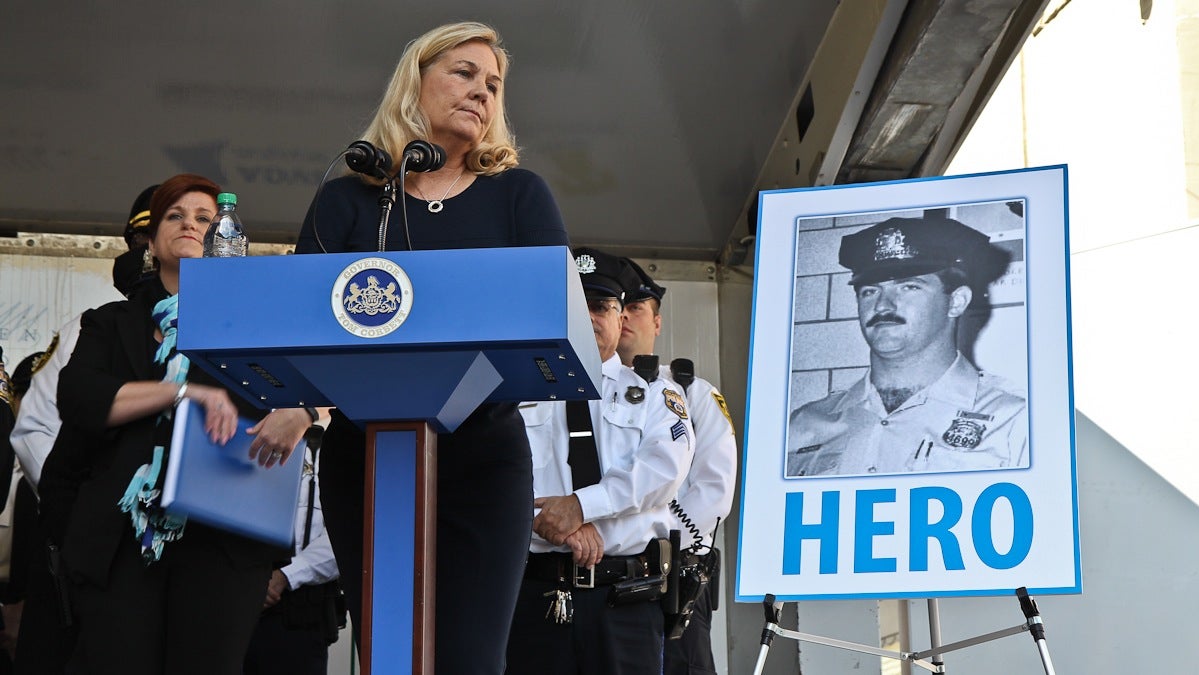After Mumia graduation address, Pa. moves to curb public speech inflicting ‘mental anguish’
Listen
Maureen Faulkner is the wife of the deceased Daniel Faulkner who was gunned down on 1300 block of Locust street in Philadelphia on December of 1981. (Kimberly Paynter/WHYY)
Pennsylvania has a new law giving crime victims and their families the chance to silence prison inmates in public.
The bill signing ceremony took place near where a Philadelphia police Officer Daniel Faulkner was killed in 1981.
After years of appeals, Mumia Abu-Jamal is still behind bars, but serving a life sentence for killing Faulkner. Though no longer on death row, Abu-Jamal sparked outrage by giving a college commencement speech this month that was recorded from prison.
The legislation introduced by state Rep. Mike Vereb (R-Montgomery County) gives victims, their families and even prosecutors the right to file civil action to stop a convicted criminal from giving public addresses or making other moves that inflict “mental anguish.” Such a prohibition would have to be sanctioned by a judge.
Gov. Tom Corbett says Faulkner’s widow Maureen has been taunted by “the obscene celebrity” that her husband’s killer has achieved from behind bars.
“With books radio commentaries and most recently a commencement speech, this unrepentant cop killer has tested the limits of decency, while gullible activists and celebrities have continued to feed this killer’s ego at the expense of his victims,” Corbett said.
Pam Africa, best known for her role in the group MOVE, led a group of protesters wearing an orange prison jumpsuit, proclaiming Abu-Jamal is innocent.
“I don’t care what they come with the Army, the Navy, the Marines the President, whatever they want,” she said. “They are not stopping our right to speak and we’re not going to allow them to stop Mumia’s right to speak and other people inside that prison.”
Other critics of the legislation say it’s vague and vulnerable to a constitutional challenge on First Amendment grounds. Vereb says that’s not the case.
“We specifically drafted this bill with a broad spectrum to simply have a judge review the facts, review the evidence,” he said. “We did not put any obligations on the court other than honoring the standing of the Attorney General the District Attorney or the victim in this case if they filed a civil action.”
At the bill signing, Maureen Faulkner said it’s painful each time Abu-Jamal makes the news.
“It’s not fair that the survivors must endure having this happen to them year after year not just myself but all survivors of violent crime and this being passed is one step to keeping the murderer Mumia Abu-Jamal silent,” she said.
WHYY is your source for fact-based, in-depth journalism and information. As a nonprofit organization, we rely on financial support from readers like you. Please give today.





